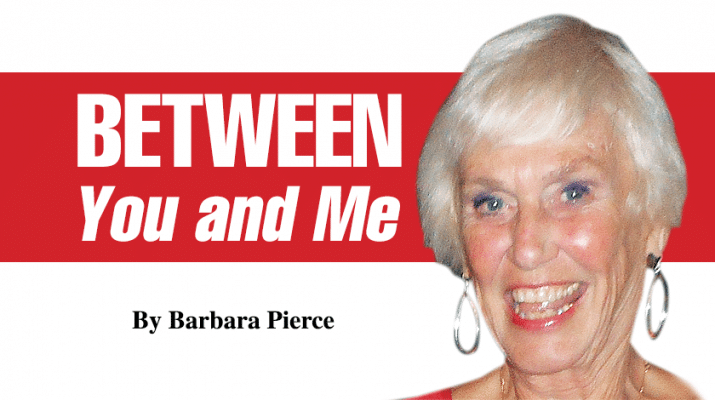Are you going to reach the end regretting aspects of your life?
By Barbara Pierce
It was kind of scary and kind of wonderful, but mostly anticlimactic, if that’s the word to describe when you do something you’ve wanted to do for a very long time. It was the last thing on my bucket list.
I was afraid that if I accomplished the last thing on my bucket list, I’d be giving my body the OK to give up. But it’s been several years since I slipped into the warm waters of the Florida Keys to cling to that dolphin’s fin and I’m still going strong.
Gradually, I’ve come to the realization that I’m old enough to die. So I don’t want to leave anything on the table. I don’t mean the fun things like swimming with a dolphin, but the sad kind of regrets that hospice caregiver Bronnie Ware writes about in her book, “The Top Five Regrets of the Dying.”
I don’t want to have any regrets as I die. I don’t want to lie on my deathbed wailing, “I should’ve done this!” or “I shouldn’t have done that!”
What Ware found:
— I wish I’d had the courage to live a life true to myself, not the life others expected of me.
“This was the most common regret,” she said. “When people realize that their life is almost over and look back on it, it is easy to see how many dreams have gone unfulfilled. Most people had not honored even half of their dreams and had to die knowing that it was due to choices they had made, or not made.”
Good health brings a freedom very few realize, until they no longer have it. Honoring yourself while you still have the ability to do it is important. Now, years later, swimming with the dolphins would be difficult for me to do.
“We assume we have all the time in the world, when all we really have is today,” she wrote.
— I wish I hadn’t worked so hard. “This came from every male patient that I nursed,” she said. “They missed their children’s youth and their partner’s companionship. All of the men deeply regretted spending so much of their lives on the treadmill of work existence.” (The women she nursed had been mostly homemakers.)
Express yourself!
 — I wish I’d had the courage to express my feelings. “I was scared to let my feelings show. Now I wish I’d let my family know how I really felt,” Ware recalls. “Many people suppressed their feelings to keep peace with others. As a result, they settled for a mediocre existence and never became who they were truly capable of becoming.
— I wish I’d had the courage to express my feelings. “I was scared to let my feelings show. Now I wish I’d let my family know how I really felt,” Ware recalls. “Many people suppressed their feelings to keep peace with others. As a result, they settled for a mediocre existence and never became who they were truly capable of becoming.
“It does take courage to express and share your feelings.”
— I wish I had stayed in touch with my friends. “You imagine they will always be there. But life moves on,” she said. “There were many deep regrets about not giving friendships the time and effort that they deserved. Everyone misses their friends when they are dying.
“Friends who accept you as who you are worth more than anything in the end. The beauty of friends is that they take us as who we are, not who they want us to be.”
— I wish I had let myself be happier. “This is surprisingly common,” she said. “Many did not realize until the end that happiness is a choice. They stayed stuck in old patterns and habits. Fear of change had them pretending that they were content, when deep within, they longed to laugh properly and have silliness in their life again.”
“Happiness is a choice. Find blessings every day and appreciate the moment you’re in. If that’s hard, pretend to be happy for half an hour. Don’t frown, complain, or say anything negative for half an hour. Say nice stuff and smile,” she said.
As I read Ware’s descriptions of the people she has known, I am so sad for them, with their deep regrets. Regretting provides nothing positive, only suffering, when we’re letting our past dictate how we should feel now.
As I see it, there are two ways of learning from this:
— First, don’t regret your mistakes; learn from them and move on. During my life, I’ve done some things I’m proud of, and some things I’m not proud of — but I’d like to think I learned something from each. We all make mistakes, but we can move past them by remembering only the lessons they offer.
Death seems less scary if you’re satisfied with the life that you’ve lived.
— Second, if you learned you have only one year to live, would you have any regrets? If so, what can you do about it, beginning now? Make peace with the past and remember that each moment is a new choice.
Life is over so quickly. It is possible to reach the end with no regrets. That is my wish for you.
• Barbara Pierce is a retired licensed clinical social worker with many years of experience helping people. If you would like to purchase a copy of her book, “When You Come to the Edge: Aging” or if you have questions for her, contact her at barbarapierce06@yahoo.com.


